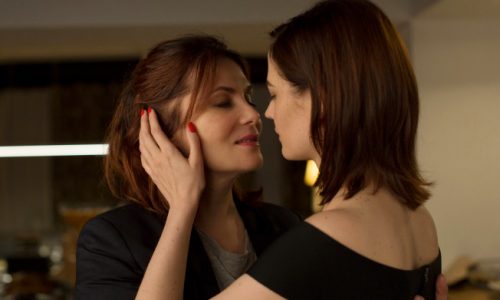
For the last time this Cannes, I was up early to get to the 8.30am screening. This was Roman Polanski’s late addition to the festival, out of competition, Based on a True Story – which was based on a novel, which wasn’t itself a true story. Polanski’s wife Emmanuelle Seigner stars as a successful author, Delphine, who befriends a mysterious woman she meets at a book signing. As Delphine struggles to make progress with her new novel, the enigmatic Elle, played by Eva Green, works her way into her personal life – moving in with her while her boyfriend is away, helping out with boring admin duties and caring for her when she falls ill. But as you’d expect from Polanski, all is not what it seems with Elle. “You keep wondering if she exists or not,” Eva Green remarked at the press conference that followed the screening. “I didn’t want to fully define her,” added Polanski. “It’s up to the public whether she’s real or not.” Here we go again – another director who doesn’t know his own story and leaves it up to the audience to fill in the gaps.
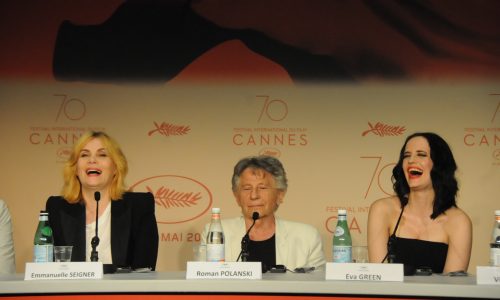
The relationship between the two women is initially intriguing, but as the plot begins to thicken, it doesn’t always feel convincing and as you start to question what’s going on, holes emerge that don’t quite make sense. Polanski manages to ratchet up the necessary tension to keep you guessing, but the denouement isn’t as satisfying as it might have been. Based on a True Story has echoes of many of Polanski’s earlier works. With Eva Green’s Elle being a ghost writer for celebrity autobiographies, The Ghost is an obvious example. It’s also Polanski’s fifth film with Emmanuelle Seigner. They have a very professional relationship, he insisted. “It’s hard to be the husband of such a great actor and it’s hard to be the director of your wife,” he joked about their home-life. “But professionally, it’s no different working with Emmanuelle to working with Eva,” he concluded.
I had to slip out of the press conference a few minutes before it ended, so that I could get to a screening of The Florida Project in the Directors’ Fortnight programme. After having failed to get into a screening earlier in the week, it was my second and final opportunity to see the film and there was a chance that I might be able to meet up with the producer afterwards, as we have a good mutual friend. From the director/writer/producer duo of Sean Baker and Chris Bergoch, the team behind Tangerine, expectations were high – and expectations were met; it has generally been so well reviewed, that many critics are wondering why it hasn’t made it into the Official Selection. As I arrived at the Theatre Croisette, at the Marriott hotel, I sent a message to Chris, who co-wrote and produced, to let him know I was there, so that if he was there, he didn’t just run off afterwards.
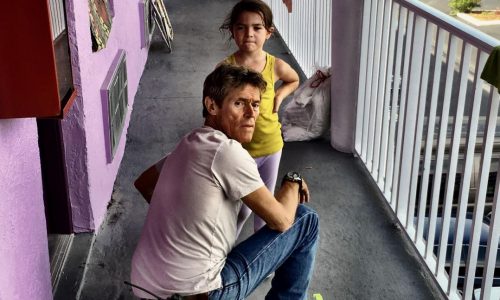
From the outset, the film appears to be a slice of life, centred on a group of mildly delinquent, bored children, living at a motel that’s become home to a number of single-parent families, struggling – with various degrees of success and integrity – to make ends meet. The motel is run by Willem Dafoe, playing against type as a manager so sympathetic and against his better judgement, supportive, that you almost wish he was your uncle. But about an hour into the film, just when you’re beginning to think “OK, I’ve met them now…and?” a plot kicks in that takes the film in a more focused direction, injecting new life into the vibrant drama that stops one step short of tragic, given that no-one dies. For a film revolving around characters who find life as difficult as they do, it’s surprisingly bright and upbeat, for much of the time, at least, largely down to the exuberance of the children. From the juvenile delinquency to the free-spirited final shot, the film had echoes of Truffaut’s Les 400 Coups. Frighteningly convincing turns from everyone from the kids to their parents and Dafoe himself make the film a gem that’s somewhat difficult to categorise, but not the less effective for it.
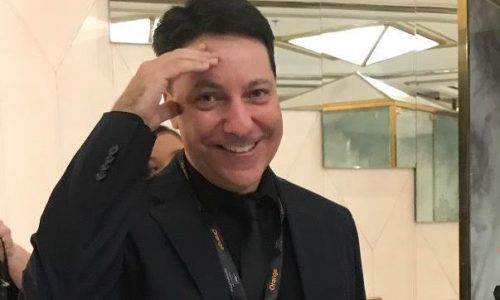
After a trek back up to street level, about three floors up, I finally made it back into the light – where I found a message from Chris telling me where he was sitting – during the screening. I remembered that he’d said he had only occasional access to wifi, which could make communication a little tough. We’d come this close to meeting, I couldn’t give up now. I managed to break back into the building and get back down to the auditorium, but by the time I got there, it was empty. So I followed a different route back outside, from the door where Chris had said he’d been sitting. As I burst back into the daylight for a second time, I saw an unassuming group of three people chatting. On closer inspection, I managed to read the name on one of their badges – it was Chris Bergoch. What a relief – it was like spotting an oasis in the dessert. Rudely, I had to interrupt – or join – his conversation to let him know we’d found each other – but that’s what Cannes is all about – it’s rude not to interrupt, here. He was chatting to two audience members he’d stopped after the screening, to ask why they’d chosen to watch his film. This is something he likes to do. “I expect everyone just answers ‘Because of Tangerine,'” I suggested. “What’s Tangerine?” asked the guy he’d been talking to; he’d luckily stumbled across one of the better films screening in Cannes by virtue of the starting time being the closest to when he got into town. Chris and I got a couple of photos together so that we could send one to our mutual friend, before arranging to meet up properly later. “I’m a DP, so I can take it,” boasted the helpful chap who clearly isn’t familiar with Nikon’s exposure controls. Hence, the photo is courtesy of Chris himself.
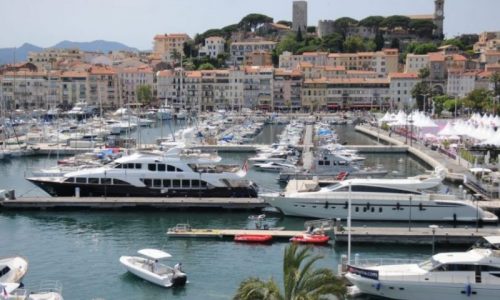
Leaving Chris chatting to what was left of his audience, I headed to the Press Terrace at the Palais to try to get some work done. I’d hoped to be able to catch another film during the afternoon, but there was a choice of five and not only had I seen them all, but I’d been fully awake during them all too. So I used this opportunity to catch up on some writing and pitch a story to my BBC colleagues back home; they’d run an interview earlier in the week, in which the actor Toby Jones had expressed his concerns about the effects that Brexit might have on the British film industry. And this interview had run unchallenged. But my interviews – with both the BFI and British sales agent Evolutionary Films – had suggested otherwise, and the editor back in London agreed. It was all very well to get a piece commissioned by the BBC, but I then had to write it and get my radio script approved before catching up properly with Chris and then getting back to the house with enough time to pack and get to the airport. Luckily, a complimentary cool glass of rose and a view to die for was oddly conducive to working – all the while checking in with Chris to see whether he was ready to meet up again. He’d be in Starbucks, he told me. His films might be a little off-beat, but it doesn’t get more LA than meeting an American producer in Starbucks…in France. I assumed he was there for the wifi and said nothing more about it.
We found ourselves a shady spot outside and talked about everything from our mutual friend, to the film business generally and his film specifically, including his creative discussions with his director about whether the plot needed to kick in just a little earlier – and his desire to write a rare sympathetic character for Willem Dafoe. We got on well enough that I felt embarrassed about constantly checking the time, but he understood. As I finally stood up to go, the woman sitting next to us interrupted apologetically to say she couldn’t help overhearing our conversation and started to go through a check-list of points she had about what we’d been saying. As I was exchanging business cards with her, it occurred to me that even when you think Cannes is over for another year, there are always more contacts to be made.
I rushed back to the house to pack, but found my house-mate, James Partridge, about to cook a slap-up late lunch to eat in the patio garden, with our Air BnB hostess, who offered us ice-cream for dessert. Time was tight, but nothing was going to get in between me and a fried-egg baguette and two boules of ice-cream ahead of an easyJet flight home – not even my packing. Between courses, I had to record and send my report back to the BBC, having finally got approval for my script.
Then, I had about five minutes to pack up my room, hoping I hadn’t forgotten anything, and trekked back into Cannes with my suitcase to catch the bus to the airport. I’d been hoping to get a bit more work done while waiting for the plane, but there was no-where to sit, because of IT problems at BA which had caused delays and cancellations for hundreds of passengers. As I queued up to board my flight to Luton, going in the opposite direction was a queue for the flight to Stansted. In it was fellow reviewer James Mottram, who I’d met at the London Film Festival reception, last weekend. I thought I’d remembered him saying he was a south Londoner; he’d been booked with BA and was delighted to have found a last minute flight that would at least get him to the right part of the country. And, as if to prove that Cannes continues right the way to the plane, I found myself waiting in line next to John and Diane from Evolutionary Films. That’s one of the oddly welcoming things about Cannes – you might be travelling alone, but you’re never alone. You see all the same same faces in all the same places.
On board, the captain gave his usual welcome, but made it topical; “A special welcome to those of you who’ve been let down by our rivals. Next time, just fly with us.” The baggage reclaim seems to be the final place where familiar faces from the Croisette continue to hover. Once you leave the terminal building, they seem to vanish into the wider population. After another week of films, press conferences, networking – and sadly none of the freebies of yesterday – my Cannes 2017 is over and real life resumes.
